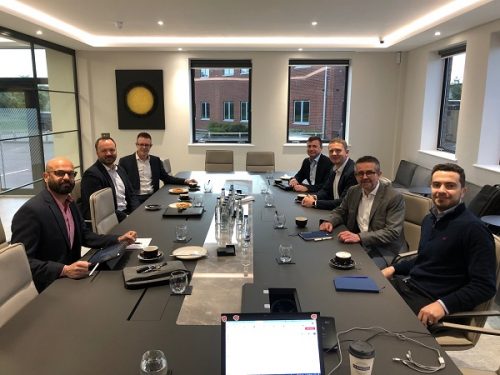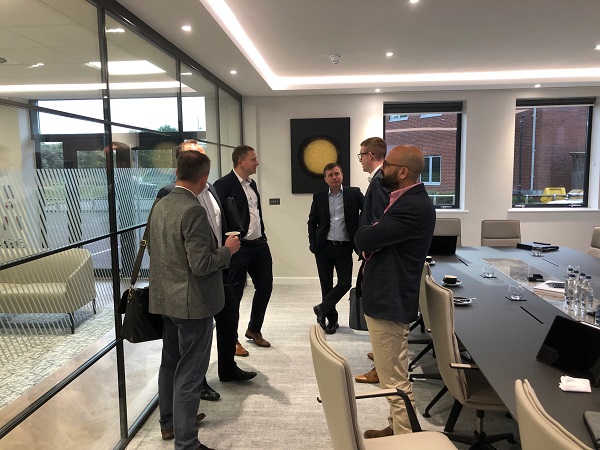Round table report: M&A – it’s good to talk

In the final of our four Anatomy of a Deal round tables, we looked both backward and forwards to discover how the deals market had changed over the last three years – and how the M&A sector will be driven in the future.

This time around we discussed the importance of early clarity in the success of a deal.
We opened the discussion by asking the panel whether they had seen any emerging trends in the M&A market in the last quarter.
David Crump, corporate finance director at PKF Smith Cooper, said that he was continuing to see good deal flow. He added: “Evaluating the profitability of any business is always the biggest challenge. We had a couple of years disruption to profitability and there have been price increases across the board since, so establishing a reliable profit number can be tricky.”
It had been the sheer weight of deals still coming through that had surprised Richard Newman, senior director, transaction management at ThinCats. “They’ve been mainly on the PE side,” he said. “However, we have noticed that a few deals have paused. Despite this, people are now more settled that Covid and Trussonomics are a thing of the past.”
Mikayil Salahov, investment manager at LDC, added: “We’re definitely seeing new deals coming through, and I think the market is prospering. Q1 was pretty quiet, but we’re now seeing things ramp up again as we head into the summer.”
James Ward, corporate finance director at PKF Smith Cooper, said: “Investor buyers are continuing to make strong bids for businesses particularly in sectors where we know they are looking to gain a foothold. Equally, we’re seeing some evidence of previously active trade buyers putting their acquisition plans on hold to focus on their core business as cost pressures start to bite.”
For Ben Lavin, consultant at Empire Finance, a lot of business owners were saying they want out and they want out now. He added: “Some owners have just had enough and are jaded after the last three years. The downside to those deals is that the vendor wants the maximum amount of money, but they haven’t done enough planning. We’re also seeing a lot of management teams who are perfectly capable, but they’re not used to taking on debt.”
Martyn Brierley, head of corporate finance at Flint Bishop, thought we were still seeing the back end of the pandemic ripple effect. “We certainly saw, coming out of Covid that then the follow on war in Ukraine, and a knock on global inflationary crisis, had taken its toll on some business owners, who then re-evaluated their longer term strategic exit plans, and in some cases, resulted in an acceleration of those plans,” he said.
Matt Vincent, senior director, regional business development at ThinCats, told the panel that he is seeing the return of a very particular type of transaction. “We are seeing a few BIMBO transactions coming back. Some of those can work for us if structured sensibly, as they can give management teams incentivisation through equity, whilst bringing external investment and strategy oversight.”
Crump, meanwhile, said that earn outs were becoming more commonplace in transactions.
Brierley concurred, adding: “It’s becoming more and more frequent that a deal has a form of earn out factored into it – where the Buyer is seeking to align Vendor expectations on value, by asking the Vendor to share some of the risk in the future expected performance of the business.”
The discussion turned to inflationary pressures, and whether stubbornly high figures were continuing to make buyers and vendors wary.
Crump said: “A buyer wants certainty – and with a rapidly changing landscape, that can become an issue.”
Newman added that “something had to give”, saying: “Wages aren’t keeping pace with inflation and cost rises. And if interest rates go up and refinancing CBILs and mortgages continue then things can look grim. But you can’t factor everything into a deal – you have to take a higher [longer term] view.”
Vincent agreed. He said: “If you want to draw definitive lines, then every deal would fall over. As lenders we must find the right balance between getting enough comfort from due diligence but accepting that there’s always going to be an element of risk. A lot comes back to making sure every deal is structured correctly.”
Clarity, then, must be critical in every deal?
“Absolutely vital,” said Crump, who added: “It’s better that a buyer is provided with everything of relevance which might impact on price and structure – and that this is set out clearly early on. No-one wants surprises.”
Brierley said that DIY deals weren’t the path to go down. “We’ve come across deals where clients agreed terms of a transaction directly between the principals without any involvement from advisors. Once advisors were appointed, it became apparent a number of issues had not been considered, or those proposed were not workable, leading to frustrations and tension between the parties, and in some instances, the deal falling over. It might seem that engaging with advisers at the very outset of a proposed transaction is an avoidable cost, and can slow down negotiations, but in the longer term, clarity of terms going into a deal should make the overall transaction much smoother and with greater prospects of a successful conclusion.”
Lavin agreed, adding: “We’ve had several of those recently – the agreement will include things that don’t make financial sense.”
Ward said: “It comes back to being well prepared and thinking about what your exit horizon is.”
For Vincent, advisors can take a lot of the sting out of a deal. “If people have brokered a friendly deal, there can be a lot of emotion involved. They think: ‘I don’t want it to be my adviser who tells me I can’t get a deal done.’ But, in reality, the adviser is there to try and strip away the emotion, which can lead to irrational decisions.”
Salahov said that, from a buyer’s perspective, he wants all the information he can get. “We appreciate the clarity – and this comes from the level of information we can get. We like to get time with management early on and build rapport and a relationship. And we like to get into equity documents as early as possible.”
Newman said it’s now more important than ever to have adviser-led deals. He added: “Every conversation I have is: we can’t afford advisers. The reality is if advisers come in too late to a deal, then they often can’t get it over the line.”
We ended the conversation talking about how the last three years of upheaval has changed the deals market.
Newman said he he’d realised just how resilient UK corporates are. He added: “It’s taught us that we just have to keep going. For me as a funder, it’s all about knowing you have management teams driving growth, and how you bring all that risk analysis together to make a deal.”
Salahov pointed out that the tech sector has been resilient. “Covid boosted the sector,” he said. “So many businesses are trying to bring tech into their companies and that will feed into their valuation. It’s a good time to sell those businesses.”
Ward said that a lot had changed in the last three years. He said: “SMEs have had to withstand a lot of shocks, but they have also received a lot of government support which, inevitably, was not well targeted. Many of our clients have been shrewd in how they’ve navigated their way through.”
Vincent added: “From a debt funder perspective, it’s been more about being involved in a transaction at an earlier stage, and being active in the structuring, rather than simply giving a credit decision on what’s in front of you. In the past funders may have said ‘Yes’ or ‘No’ to a transaction, but funder input to the deal structure at an early stage can be the difference between deals happening, or not, for your client.”

Lavin agreed and added: “The longer you let it drag on, the more comes into the mix. It’s about spending a lot more time putting a plan in place. It’s scary the amount of people who don’t. The most important element to achieving a successful deal is having a plan in place.
Brierley said he’d seen the benefits of keeping in regular contact with clients through a deal process. He said: “We’ve learnt the help you can give to a client is by being a regular touch point. We scarcely did video calls with clients before the pandemic, but with the onset of Teams and similar platforms, both us as advisors, and our clients, are much more accessible than before throughout the lifecycle of a transaction. Touchpoints with clients are a lot more frequent – and that’s a stark difference for the better.”
We hope you enjoyed our top-to-bottom look at the deals market across the region over the last 12 months through the Anatomy of a Deal round tables. Many thanks to PKF Smith Cooper, ThinCats and Flint Bishop for sponsoring and hosting these events.
To catch up on the rest of our Anatomy of a Deal series, please click here. And if you’d like to discuss future round table series, please get in touch.








